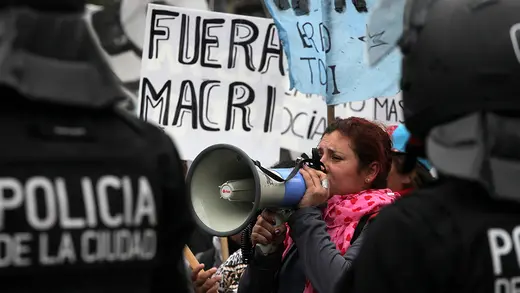Argentina’s Default Risk: What to Know
With elections approaching, Argentina faces yet another debt crisis.
By experts and staff
- Published
By
- Andrew ChatzkyWriter/Editor, Economics
Argentina, South America’s second-largest economy, recently asked its creditors for more time to pay back some of its $275 billion worth of foreign debt. A sovereign default would be Argentina’s ninth, a staggering tally for a country that was richer than France, Germany, and Italy just over a century ago. The move, along with recent primary results that cast doubt on President Mauricio Macri’s reelection prospects, may augur another shakeup in Argentina’s perennially unstable politics.
The Money Is No Longer Rolling In
Global investors initially cheered the 2015 election of Macri, who took over after more than a decade of populist rule by Argentina’s leftist Kirchner family. The pro-market and pro-U.S. Macri promised to undo his predecessors’ protectionism, reform currency and tax policies, and promote the return of foreign investment. At the same time, Macri shied away from immediately cutting Argentina’s fiscal deficit, instead issuing more debt on the global bond market to support domestic spending programs.
But in 2018, investment began to dry up, and Macri decided to accept a record $57 billion loan from the International Monetary Fund (IMF) to keep fiscal cuts relatively low. A year later, Macri has seen his political support plummet, and markets have responded badly. Investors continue to pull their money, sending the peso into freefall against the dollar. A weaker peso makes it more expensive for the country to service dollar-denominated loans, and with $30 billion worth of debt due in 2019 and several big payments to the IMF scheduled for the next presidential term, the specter of default has returned.
Old Foes: Argentina and Its Creditors
Argentina has experienced many cycles of boom and bust. These swings have been exacerbated by a reliance on exporting commodities, whose prices fluctuate drastically, and a recurring willingness to run up large debts to pay for social programs. Some experts argue this cycle is now ingrained in the Argentine psyche—Buenos Aires even has a Museum of Foreign Debt.
It’s unsurprising, then, that many Argentines express contempt for international lenders such as the IMF, which often imposes spending cuts and other austerity measures as part of its bailout programs. The last loan deal the IMF reached with Argentina before 2018’s coincided with the country’s deepest-ever recession, in late 2001. “Rightly or wrongly, Argentines blame the IMF for precipitating their country’s worst economic crisis,” writes CFR’s Shannon K. O’Neil. That’s why Macri’s decision to accept an IMF program was a huge political gamble.

The 2001 turmoil paved the way for the presidencies of Nestor Kirchner and his wife, Cristina Fernandez de Kirchner, from 2003 to 2015. Under the Kirchners, Argentina was stuck in an acrimonious legal fight with creditors who refused any offers below the full value of their Argentine bonds. In turn, the country was cast out of foreign debt markets until 2016. Relations with the United States, particularly during Ms. Kirchner’s presidency, deteriorated.
Meanwhile, experts worried that the country’s initial fast growth under the Kirchners was built on unsustainably high commodity prices for many Argentine exports. When the global economy slowed in 2008, the administration resorted to manipulating official statistics and, unable to borrow from international markets, began printing more money to cover growing fiscal deficits—a tactic that economists say fed inflation.
A New (Old) Argentina
Macri promised to move past this history. He thought his market-friendly approach could boost growth and attract investment, and he quickly settled with Argentina’s holdout creditors. But rather than implement a “shock” austerity program, which would have immediately undone all of the welfare programs and protectionist measures the Kirchners implemented and risked political backlash, Macri decided to move gradually. Economists worry it was too little, too late.
High inflation and capital flight persist, and recent polls suggest Ms. Kirchner will likely return to power in the coming months—this time as vice president. Macri has sought to right the ship with capital controls and price freezes, some of the same economic policies he campaigned against in 2015. However, with the first round of elections set for October 27, yet another Argentine debt crisis could soon lead to Macri’s downfall.